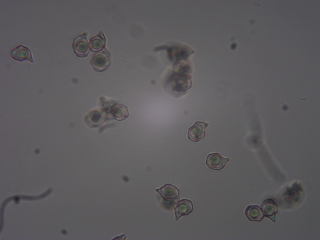This afternoon was a bit of a reconnaissance mission, ahead of the main event tomorrow. I thought I'd just have a quick look and see what's about. And oh my goodness, there's SO MUCH fungus out there! This is what I found...
[Posted this evening to give folk a chance to tell me if I've got any wrong.]
UPDATE 01/09/2018 - remembered a couple I missed out, and got a couple of corrections overnight.
1. Silverleaf Fungus Chondrostereum purpureum
2. Possible Hydropisphaera (= Nectria) peziza. I'm referring to the tiny orange blobs here – needs confirmation under the microscope.
UPDATE 3/9/2018:
Nick Aplin has advised that H. peziza has 1-septate striate ascospores with two big droplets. A bit like this then:
 |
| 400x magnification + digital zoom, mounted in water. |
 | |
| 1000x magnification + digital zoom, stained with Cotton Blue & mounted in water. |
I think that confirms the orange specks as H. peziza.
3. Fairy Inkcap Coprinellus disseminatus
I cheated a bit with this one as the fruit bodies are too small to ID, but this log frequently hosts a mass of Fairy Inkcap Coprinellus disseminatus, and I reckon it's getting ready to put on a good show tomorrow.
UPDATE 3/9/2018:
I was a couple of days out with my prediction, but the Fairy Inkcaps C. disseminatus are indeed back:
4. Livid Pinkgill Entoloma sinuatum
New species for me. Am in the process of getting a spore print which will hopefully allow me to confirm this as E. sinuatum. Gorgeous looking mushroom! And very poisonous apparently.
Have managed to get a look at the spores and they have a very distinctive pointy 'germ pore', which I think confirms E. sinuatum...? Although I can only see one previous West Sussex record on the FRDBI database.
Richard Shotbolt has advised me that E. sinuatum "should have a mealy smell with a nasty undertone", so I went back and had a sniff. I think I caught the mealy smell, and definitely picked up the nasty (positively evil) undertones.
5. Cinnamon Bracket Hapalopilus nidulans (?)
If I've got this one right the flesh should turn purple on exposure to KOH. Voilá!
6. Holly Speckle Trochila ilicina
7. Phacidium multivalve (?)
I should probably take a look at these under the microscope.
8. Blackedge Bonnet Mycena pelianthina (???)
9. Rusty Bolete Xerocomus ferrugineus (?)
Geoffrey Kibby has advised, over on the British Mycological Society Facebook page, that with the white flesh this is more likely to be X. ferrugineus (not X. subtomentosus, which has pale lemon flesh).
10. Oak Curtain Crust Hymenchaete rubignosa
11. Black Bulgar Bulgaria inquinans
12.
I may have been a bit over-confident ID'ing this one as Gymnopus dryophilus. That species is supposed to have knobbly bits on the edge of the gills, which I can't seen any sign of...
Might have to try a bit harder with this one.
13. Spindleshank Gymnopus fusipes
14. Blackening Brittlegill Russula nigricans
15. Nut Disco
Hymenoscyphus fructigenus Unidentified
ascomycete on hazelnut
As Nick Aplin says, "'Nut Disco' - It's too easy to use this name for any asco that grows on nuts..."
I'd better do some more work on this one if it's going to make the Bioblitz species list.
16. Birch Polypore Piptoporus betulinus
17. Peeling Oysterling Crepidotus mollis
18. Green Elfcup Chlorociboria aeruginascens
Spores are around 8 microns long, which I think confirms this as C. aeruginascens.
19. Beefsteak Fungus Fistulina hepatica
20. Alder Tongue Taphrini alni
[Rubbish photo. Here's what it looked like back on 9 July 2018...]
21. Blushing Bracket Daedaleopsis confragosa
22. Jelly Ear Auricularia auricula-judae
For the record
Date: 31 August 2018
Location: Hoe Wood [public section], Woods Mill
Records entered into FRDBI 07/09/2018




































No comments:
Post a Comment